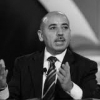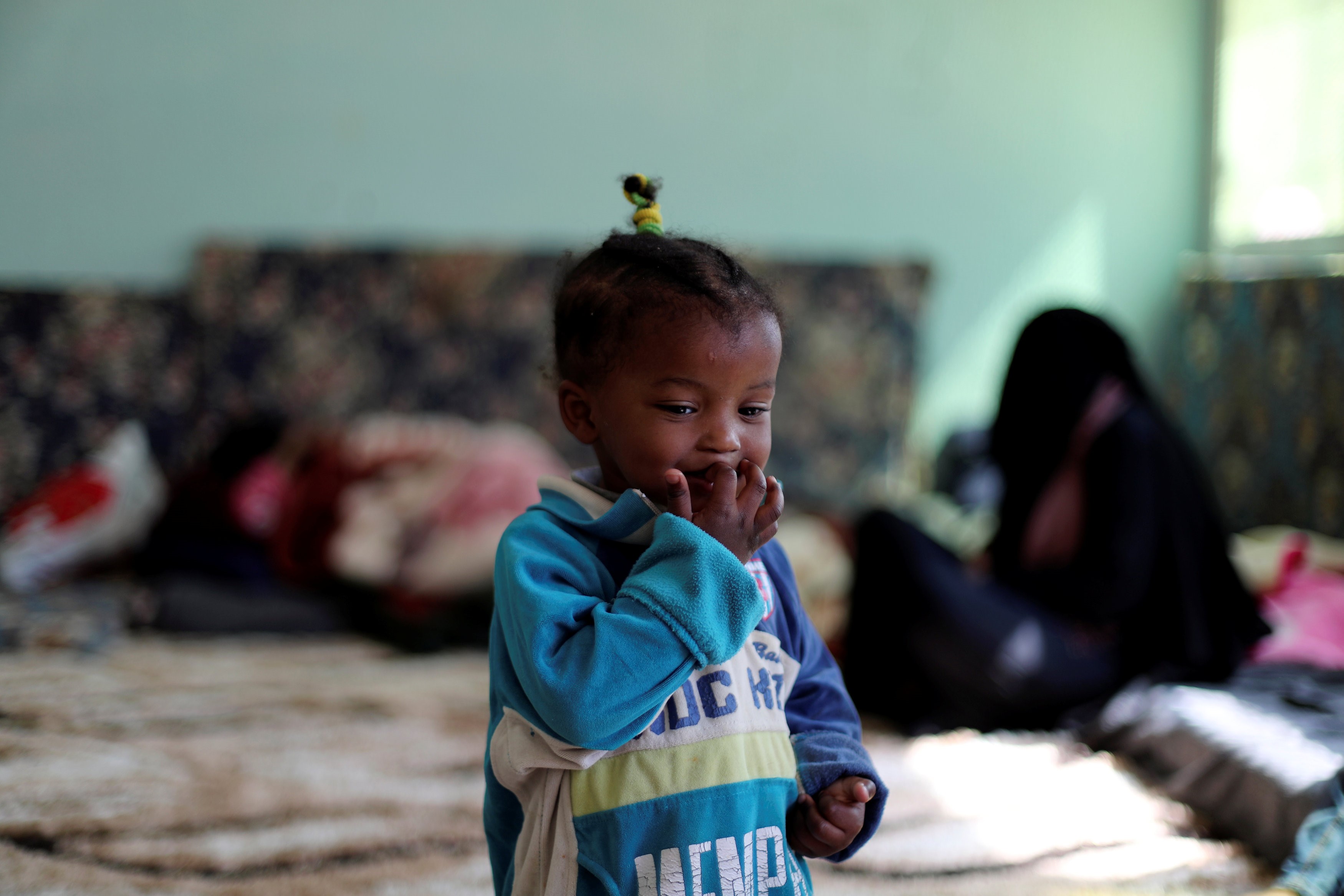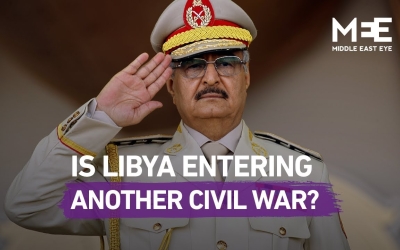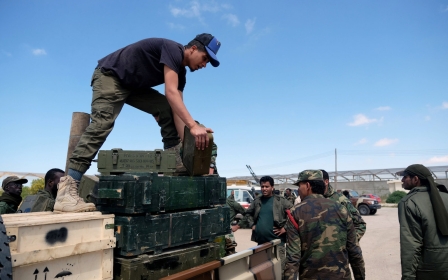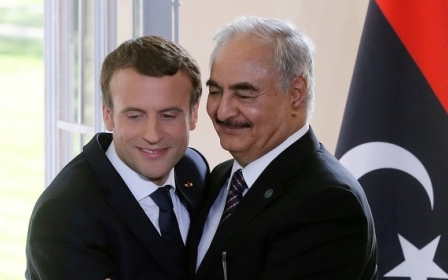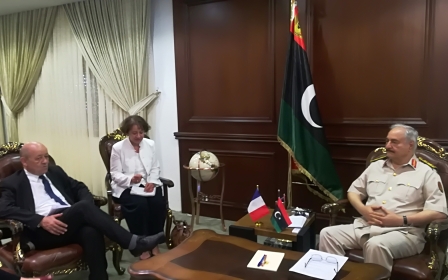Haftar's war aims to return Libya to military dictatorship. He must be stopped
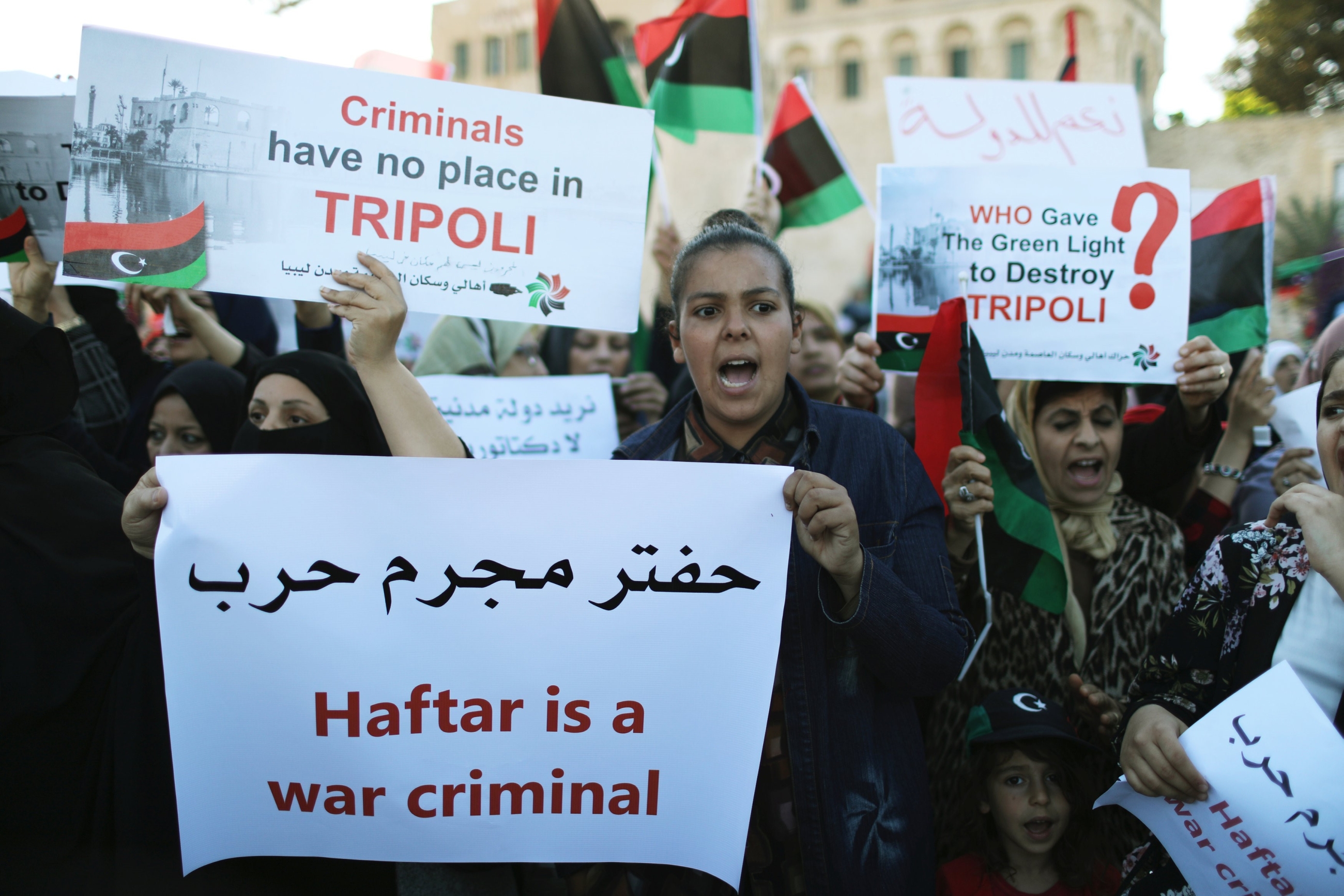
The recent outbreak of war in Libya, which began on 4 April, has taken most people inside and outside of Libya by surprise.
Just a few weeks earlier, on 27 February, both eastern military leader Khalifa Haftar and Prime Minister Fayez Serraj were hosted in the UAE for the latest round of peace talks to resolve the Libyan conflict, facilitated by the special representative of the UN in Libya, Ghassan Salame.
In search of a deal
The meeting was aimed at reaching an agreement on a power-sharing deal between the different sides, preparing for the UN-backed national conference planned to be held on 14-16 April in Libya, as well as finding a way to hold presidential and parliamentary elections.
The attack on Tripoli has exposed Haftar as being deceitful about reaching a political settlement
However, this was all thrown up in the air when on 3 April, Haftar declared war on Tripoli in a recorded broadcast in order to "liberate" the capital and the entire west of Libya of the "criminals and terrorists", referring to the forces under the UN-recognised Government of National Accord (GNA), headed by Serraj.
This latest move was viewed by Serraj and others as a treacherous stab in the back that exposed Haftar as being deceitful about reaching a political settlement.
It also showed that Haftar's attendance at all the international peace talks, including the highly publicised conferences in Paris, Palermo and most recently the meeting in Abu Dhabi, was merely a tactic to buy time while plotting a surprise attack against his opponents in the west of the country.
Why now?
Haftar was swift in his advance on Tripoli. He quickly took up positions in the mountain city of Gharyan (80km south-west of Tripoli) and elsewhere south of the capital, hoping to use an element of surprise in his military advances.
Fighting has since raged on several fronts after the GNA forces quickly mobilised and were deployed to resist his advance on the capital.
There are numerous reasons why Haftar has decided to accelerate his move on Tripoli at this point in time, the main one being that such an attack has managed to put an end to the much anticipated national conference, organised by the UN Special Mission in Libya (UNSMIL), which was going to take place in the Libyan city of Ghadames.
The national conference was expected to achieve a breakthrough in the political deadlock and eventually produce a new roadmap to end the Libyan conflict, which would entail holding new elections to unite the country's divided institutions.
Any agreement would have potentially put an end to Haftar’s endgame of taking over power in Libya and returning the country to the rule of military dictatorship, an aim shared by his main regional supporters, the UAE, Egypt and Saudi Arabia.
Extensive support
Haftar would not have been able to maintain his military campaign over the last five years, and be in a position to launch his latest offensive against the capital Tripoli, without the extensive regional and international support he has been receiving.
The regional support has been coming mainly from Saudi Arabia, the UAE and Egypt, while important international players such as France and Russia have also been providing him with logistical and political backing.
Haftar would not have been able to maintain his military campaign over the last five years without the extensive regional and international support
A week before he launched his surprise attack on Tripoli, Haftar made a well-publicised visit to Saudi Arabia in which he met with King Salman and Crown Prince Mohammed bin Salman. The crown prince had "promised tens of millions of dollars to help pay for the operation, according to senior advisers to the Saudi government", according to reports.
Some news reports claimed that during this visit, Haftar was given the green light by the Saudis to go ahead with his plans to take over Tripoli by force.
Since he launched his "Operation Dignity" in 2014, UAE support for Haftar has been well documented. The widespread backing included military, political, media, intelligence and logistical support.
The interior minister of the GNA, Fathi Bashagha, has publicly accused the UAE of sending Haftar military aid for his war on Tripoli in what he called a clear violation of international law.
Bashagha claimed he had received information about an aircraft that came from Abu Dhabi, which landed in Benghazi's Benina Airport with military equipment for Haftar's forces.
The 'Sisi model'
Besides Saudi Arabia and the UAE, Egypt has been a staunch supporter and sees Haftar as being able to emulate the "Sisi model" in Libya, where the army takes power and control over all state institutions.
It views Haftar as an ally who could stop what it perceives as a terrorist threat on its western border.
It also hopes that he can help in eradicating Islamist groups in Libya, mainly the Muslim Brotherhood, so that they do not provide any form of support for their partners in Egypt, whom Sisi has managed to suppress through his own military coup.
Egypt has been supporting Haftar’s latest attack on Tripoli by providing him with intelligence and military advisors and would welcome him taking complete power in Libya.
Meanwhile, France has blocked a draft EU resolution that would have condemned Haftar’s attack on Tripoli and called for him to retreat.
Unconfirmed reports widely circulated within Libya alleged that French military advisors are present and providing Haftar’s forces with support at his command centres in the west of Libya since his attack on Tripoli.
Russia views Haftar favourably and would not object to him taking over power by force
Russia, another key international player, has also backed Haftar who visited the country several times in recent months.
A pro-Haftar news outlet claimed he met Russian officials just a few days after he launched his military advance on Tripoli. Haftar is believed to be seeking military support and fresh supplies of weapons and ammunitions.
Russia blocked a UN Security Council statement that would have called on Haftar’s forces to halt their advance on Tripoli and withdraw to their previous positions before the attack.
The move indicates that Russia views Haftar favourably and would not object to him taking power by force in Libya and return the country to military rule.
Where is Libya heading?
Haftar’s ongoing military campaign and his latest advance on Tripoli, supported by regional and international players, leaves the political process and reconciliation efforts in limbo.
There is a serious risk of further escalation of war and violence, pushing the country into a catastrophic and prolonged civil war.
It could also cause a sudden increase in terrorist activities by groups such as Islamic State (IS), and potentially increase the flow of illegal migration into Europe, as the war rages on.
Haftar’s latest war may further damage an already fragile Libyan economy, especially causing a halt or severe reduction in crucial oil and gas production and exports.
The humanitarian situation will be plunged into a new crisis, causing innocent Libyan citizens to suffer most.
The probable main political consequence is Haftar succeeding in his campaign of returning Libya to military dictatorship, which means that the sacrifices made by Libyans in the 2011 revolution will be in vain and their aspirations for freedom, democracy and a civilian state will be completely shattered.
This article is available in French on Middle East Eye French edition.
Middle East Eye propose une couverture et une analyse indépendantes et incomparables du Moyen-Orient, de l’Afrique du Nord et d’autres régions du monde. Pour en savoir plus sur la reprise de ce contenu et les frais qui s’appliquent, veuillez remplir ce formulaire [en anglais]. Pour en savoir plus sur MEE, cliquez ici [en anglais].


